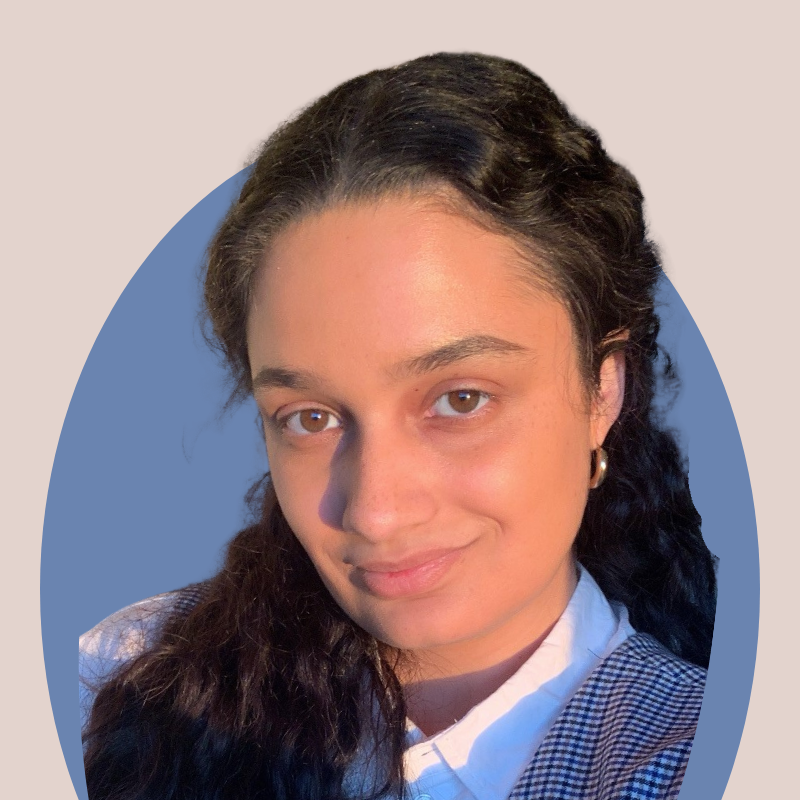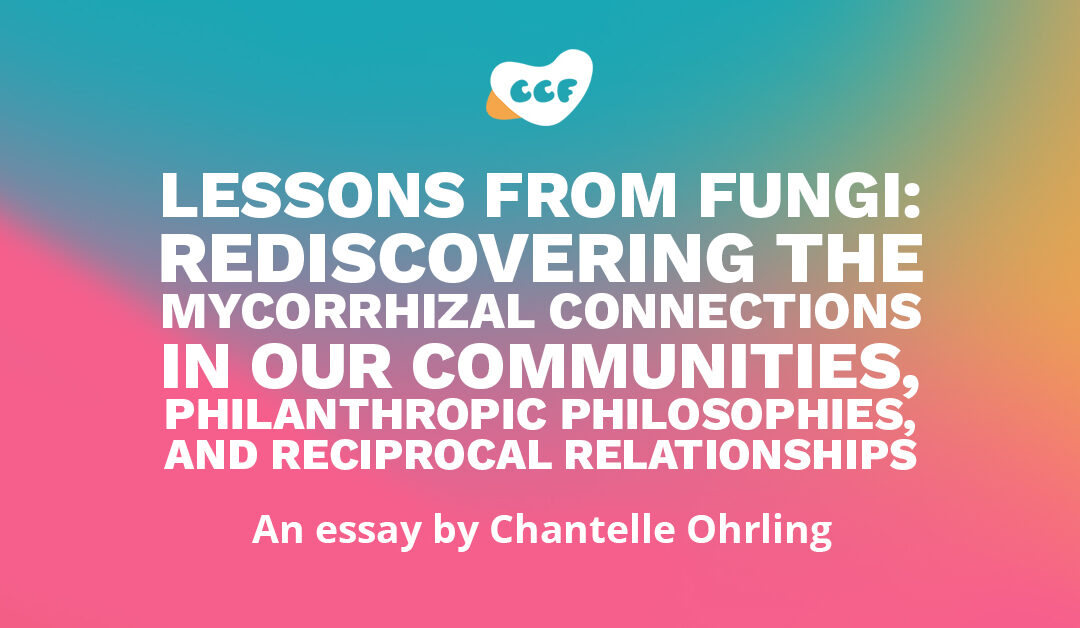By Chantelle Ohrling, a curious and grateful guest on Turtle Island
As we know, ecosystems are a place, but they’re more than that—they’re a carefully calibrated community. Applying this understanding to our sector, we must reject the individualism of white supremacy, opting instead to create an ecosystem of love, accountability, and trust.
The inspiration for writing this essay came after reading two very different texts.
The first was a book called Entangled Life by Merlin Sheldrake, which is about the beauty of fungi and all that they do for their living relations. The second was Resonance: A Just Transition Guide for Philanthropic Transformation published by Justice Funders. In it, they detail how and why philanthropy is to redistribute wealth and democratize power to shift economic control to communities with their Resonance Framework.
While the two texts may seem like very different subjects, I find that healthy communities function similarly to healthy ecosystems, and both can function in harmony for the well being of the other. This understanding is something I’ve been shown by Indigenous teachings and values, including Braiding Sweetgrass by Dr. Robin Wall Kimmerer
***
You now find yourself deep in the heart of a vast rainforest, listening to the ancient trees whisper-rustle century old tales of interconnectedness. Herein lies a hidden community quietly working harmoniously for equity and justice amongst their growth.
You will catch its comforting presence if you breathe deeply and attentively. You look carefully to find fungi on a log, alchemizing decaying matter into nutrients for new life. Grabbing a handful of soil reveals rich, dark, earth filled with mycelium and deep roots—preventing soil erosion while equitably distributing nutrients, water, and information.
Here, every element plays an incredibly unique yet crucial role. Every role is valued, as they are all needed to maintain harmony within the ecosystem.
Beneath the heavy, aged weight of the cedars and the as-delicate-as-lace ferns, mycorrhizal networks quietly hold together the deeply reciprocal relationships of all living relations in this ecosystem, equitably promoting the health and safety of the community. Ecosystems thrive symbiotically by sharing nutrients, water, and information through these networks.
This exchange is a naturally occuring example of community-centric philanthropy, and how I envision our sector’s future.
As we know, ecosystems are a place, but they’re more than that—they’re a carefully calibrated community. Applying this understanding to our sector, we must reject the individualism of white supremacy, opting instead to create an ecosystem of love, accountability, and trust.
In this ecosystem, philanthropy is not just an act of charity but a commitment to collective well-being, rooted in reciprocity.
Fundraisers understand the value of a network. Just as plants use mycorrhizal networks, fundraisers should use their relationships to distribute resources where they’re needed. We understand that true empowerment comes not from handouts from above nor individualism but from the strength of the community.
Rather than waiting for benevolent donors to swoop in with solutions, we bolster our communities by pooling talents and resources to address the needs of the whole. As Dr. Robin Wall Kimmerer has said, “All flourishing is mutual.”
Our rainforest ecosystem, unlike capitalism, does not hoard resources. When injured, a tree communicates through its roots sending a signal to neighbouring trees triggering them to share nutrients. Neighbouring trees don’t wait until they’ve received a plan for the use of nutrients, and they don’t expect long reports on how their nutrients were used; they simply transfer them to the front lines where needed.
This way of working is an example of trust-based philanthropy in action. In this scenario, foundations would respond to calls from the front line and those in the community, and have a plan to “spend down” rather than just providing the minimum disbursement quota. Without convoluted applications and without stringent reporting requirements we are redistributing wealth while shifting economic control to our ecosystems of community.
Mother trees are large trees that act as centralised hubs supporting communication and nutrient exchange amongst smaller, younger trees. Tapping its vast mycorrhizal network, mother trees supply seedlings with the necessary resources and nutrients to grow.
Rather than competing with smaller organisations, in our philanthropic ecosystem large established charities are uplifting them by practising supportive philanthropy—something my organization does by lending grant writers to smaller organisations. Just as mother trees support the younger trees around them, the collective community’s well-being is centred around one primary mission.
As fundraisers, we understand that information and time are important resources. Just as plants can interpret sound, respond to touch, recognize their own kin, communicate with each other about impending threats, and summon help when under attack or needed, the networks we cultivate can have a similar impact on front line communities. By sharing lessons learned and relationships throughout our networks, we empower all groups doing the work.
This exchange of knowledge and resources, and genuinely listening to the needs and priorities of communities strengthens authentic reciprocal relationships and motivates us to continue our work.
bell hooks reminds us “If we want a beloved community, we must stand for justice, have recognition for difference without attaching difference to privilege.” Within healthy ecosystems, each individual plays a unique yet crucial role, and is valued for that. Similarly to how fungi adapts to best fit its local environment and the needs of that environment, each member of our community contributes to their abilities and resources and receives based on their unique needs.
Our organisations demonstrate the value of the individual through equitable action—creating a community of belonging regardless of whether they are a donor, board member, beneficiary, “front line fundraiser,” or the hero behind the scenes who keeps our database clean.
Steadily and surely, we are reclaiming “philanthropy” and returning it to its original Greek meaning of “love for humanity.” Putting it in direct opposition to the hyper-exploitation and extractivism we live with now under capitalism brought to Turtle Island on the ships of colonialism.
Philanthropy currently functions as an arm of capitalism, upholding systemic injustices left over from colonialism. Tracing back the origins of this philanthropic wealth will take us to the exploitative extractive industries that continue to destroy our ecosystems. Fungi are powerful enough to break down and clean up oil spills, and philanthropy can be powerful enough to transform colonial systems and extractive industries into regenerative economies which benefit and value all living beings.
It’s not enough to stop the bad and divest from their power; we must build the new and invest in the power of our communities. Audre Lorde reminds us “Anger, used, does not destroy. Hatred does.”
Fundraisers are already familiar with alchemizing anger and fear over injustices into hope and positive actions. It seems as though every other day, I’m listening to a donor’s climate anxiety and attempting to imbue them with hope.
Steadily and surely, we are reclaiming “philanthropy” and returning it to its original Greek meaning of “love for humanity.” Putting it in direct opposition to the hyper-exploitation and extractivism we live with now under capitalism brought to Turtle Island on the ships of colonialism. Guided by reciprocal relationships with the land, Indigenous values globally embrace a model of giving that honours their interconnectedness with all living relatives.
Every act of giving is an act of love, a recognition of the inherent worth and dignity of each member of our communities. Whether it’s through mutual aid networks, community-led initiatives, or culturally grounded practices of giving and receiving, philanthropy here is a celebration of the richness and diversity of human experience.
Many Africans are familiar with Ubuntu, which approximately means “I am because we are,” or “I am who I am because of who we all are.” The philosophy of Ubuntu is a beautiful reminder of the interdependence of humanity, and the importance of centering community.
In the Great Lakes region of North America, Dr. Robin Wall Kimmerer in Braiding Sweetgrass generously shared with us the teachings of the honourable harvest that the Anishinaabek Peoples live by. Their neighbours, The Haudenosaunee Confederacy, have a core value called the Seventh Generation: “Look and listen for the welfare of the whole people and have always in view not only the present but also the coming generations, even those whose faces are yet beneath the surface of the ground — the unborn of the future Nation.”[1] Asking us to make decisions which would be sustainable for seven generations.
In the Caribbean, my own ancestors, the Taíno, were described by Columbus as “the best people in the world, and beyond all the mildest… a people so full of love and without greed… They love their neighbours as themselves.”[2] His observation captures Taino’s cultural practice of Matu’m, which directly translates to generosity.
In this communal ecosystem, we have returned to these and other Indigenous values.
As a heavy, deep golden, late afternoon sun filters through the canopy on this thriving community, we can thank the fungi and fundraisers for helping with the restoration of this ecosystem. Guided by the values of community-centric fundraising, we weave a rooted tapestry of resilience and solidarity, a testament to the power of collective action and shared purpose. Growing off of the mossy backs of those who came before, we embody deep gratitude.
In this forest, where reciprocal relationships run deep and the bonds of kinship are strong, there is hope. Angela Davis knew “It is in collectivities that we find reservoirs of hope and optimism.” In the hands of a community united in purpose, philanthropy becomes more than just a tool for charity—it becomes a force of transformation—a just transition—a path toward a more equitable world for all.
Footnotes

Chantelle Ohrling
Chantelle Ohrling (she/her), comes from a long line of rebellious Afro-Taíno women. When she isn’t nerding out about planned giving at Ecojustice or with her nose in a book, she’s appreciatively wandering the land of the Coast Salish, Musqueam, Shishalh, Squamish & Tsleil-Waututh Peoples. She honours her responsibilities to her communities by working for environmental protection, strengthening Black communities locally and internationally, and ceaselessly advocating for Indigenous Sovereignty. She believes we can alchemize oppressive systems ( much like fungi decompose dead matter) into fertile ground for new societies rooted in reciprocal relationships based on deep care and respect for all living relations. You can find her on LinkedIn.
Discover more from CCF
Subscribe to get the latest posts sent to your email.


So excited to see your writing Chantelle and get some great connections between the Earth and our fundraising practice.
Favorite section is the conclusion,
“We can thank the fungi and fundraisers for helping with the restoration of this ecosystem. Guided by the values of community-centric fundraising, we weave a rooted tapestry of resilience and solidarity, a testament to the power of collective action and shared purpose.”
Thank you for reading, Abigail! You’re one of the folks who inspires me to write so it means a lot.
Good work Chantelle.
A well written and thought provoking essay.
Your bringing together Mother nature and philanthropy was very well done.
Ecojustice should be proud to have you on their team.
Loved reading this! I also love adding these books to my future reading lists.